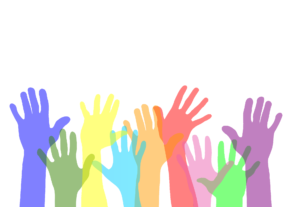
This past Shabbat, I finally corrected an omission in my reading – I spent my time with Judith Plaskow’s Standing Again At Sinai. This book came out in 1990, so I really don’t know what has taken me so long. While it is written from the point of view of Jewish feminism, if you’ve ever felt othered by the patriarchy, this book is for you.
I have a feeling I will be mining this book for conceptual gold for a long time, but today I wanted to think with you a little bit about the concept of community. We all think we know what it means, but one thing I am learning these days is that words have many meanings, and the one we assume is true is not necessarily the most useful and cogent.
If you look in the dictionary, you will find something like this (from the Cambridge English Dictionary):
all the people who live in a particular area, or a group of people who are considered as a unit because of their shared interests or background:
– the scientific community
– Bus fares were raised despite the protests of the community.
– There’s a real sense of community (= caring and friendly feeling) in this neighborhood.
So a community can be a group of people who are considered as a unit. This is not something we usually want – every #NotAllX hashtag protests against the idea that we should be lumping people together in a group. There’s no question that stereotypes can be deeply harmful. Surely every individual has their own value and deserves to be seen on their own, apart from any preconceived ideas about groups they belong to. That is undoubtedly true.
And yet – community is something we all deeply yearn for, even if we say we don’t. The other day I saw a meme on social media declaring that “the warrior is strongest when he (sic) is alone”. Is he really? Some people clearly want to think that, and I’m wondering whether they are confusing freedom with isolation. I know that is something I did as a teenager. I hope I’m wiser now.
One of the beautiful ways in which feminism can improve our lives is by rejecting isolation as a virtue, and encouraging community – not so the group can tell us what to think or feel, but so that we can reach out to others and feel supported and loved, and include the good of the community in our considerations as we make our autonomous decisions. It’s a great way to learn to check our privilege, too.
Is community an important value in your life? I’d love to know what you think about the thoughts I’ve developed here. Drop me a message!
